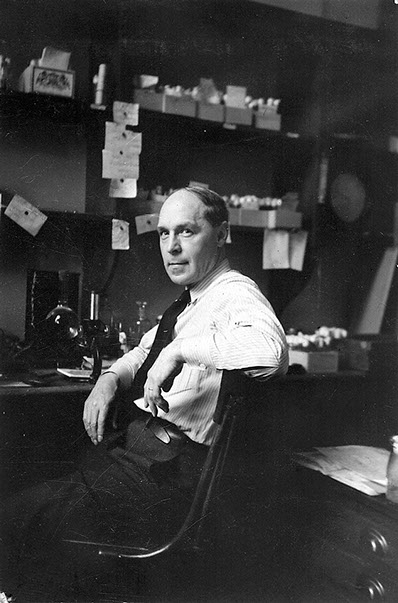Why was Hermann Joseph Muller Awarded the Nobel Prize for Physiology or Medicine in 1946?
Hermann Joseph Muller: Pioneering Discoveries Earned Him the Nobel Prize for Physiology or Medicine in 1946
In 1946, the Nobel Prize for Physiology or Medicine was awarded to Hermann Joseph Muller, an American geneticist, for his groundbreaking work on the effects of X-rays on genes and the consequences of mutations in living organisms. Muller’s pioneering research not only established the field of radiation genetics but also laid the foundation for understanding the intricate relationship between genetics and evolution. This article explores the significant contributions that led to his well-deserved recognition by the Nobel Committee.

The Discovery of X-ray Induced Mutations:
Hermann Muller began his research journey in the early 1920s, at a time when the understanding of genetics was still in its infancy. He became particularly interested in the effects of X-rays on living organisms and their genetic material. In 1927, he conducted a series of groundbreaking experiments with the fruit fly Drosophila melanogaster, which was a popular model organism for genetic studies.
Muller exposed fruit flies to X-rays and observed the subsequent generations. His experiments revealed that X-rays caused mutations in the flies’ genes, resulting in visible changes in their characteristics. These findings not only confirmed the mutagenic potential of X-rays but also demonstrated the link between mutations and changes in heritable traits, which laid the foundation for the study of radiation genetics.
Insights into Genetic Mutations and Evolution:
One of Muller’s most significant contributions was the realization that mutations played a critical role in evolution. Before his work, the mechanisms behind genetic variation and its impact on the evolution of species were not fully understood. Muller’s experiments with Drosophila provided valuable evidence that mutations were the driving force behind the diversity of traits observed in natural populations.
Furthermore, Muller’s work offered insights into the significance of genetic mutations in the occurrence of hereditary diseases in humans and other organisms. By demonstrating the mutagenic potential of X-rays, he emphasized the importance of considering the harmful effects of radiation on the genetic material of living beings.
The Impact on Human Health and Public Awareness:
Muller’s research not only contributed to our understanding of fundamental genetic processes but also had a profound impact on human health. His work raised awareness about the potential risks of exposure to ionizing radiation, leading to a more cautious approach to medical X-rays and other sources of radiation. This emphasis on safety and radiation protection has undoubtedly saved countless lives and prevented unnecessary harm.
Recognition and Legacy:
In 1946, Hermann Joseph Muller was awarded the Nobel Prize for Physiology or Medicine in recognition of his exceptional contributions to the field of genetics and his groundbreaking discoveries on the mutagenic effects of X-rays. His research not only advanced our understanding of the fundamental principles of genetics but also had a profound impact on various scientific disciplines, including evolutionary biology, molecular biology, and medicine.
Muller’s work inspired generations of scientists to explore the complex world of genetics and paved the way for further advancements in the field. His emphasis on the importance of understanding and mitigating the harmful effects of radiation on living organisms remains highly relevant today, especially in the context of modern medical and industrial practices that involve radiation exposure.
Hermann Joseph Muller’s Nobel Prize-winning research on the mutagenic effects of X-rays and their impact on genetics was a pivotal moment in the history of science. His pioneering work not only established radiation genetics as a new field of study but also provided crucial insights into the mechanisms of genetic mutations and their significance in evolution. Muller’s legacy continues to inspire scientists worldwide, as they strive to unravel the mysteries of genetics and its implications for human health and our understanding of life itself.




